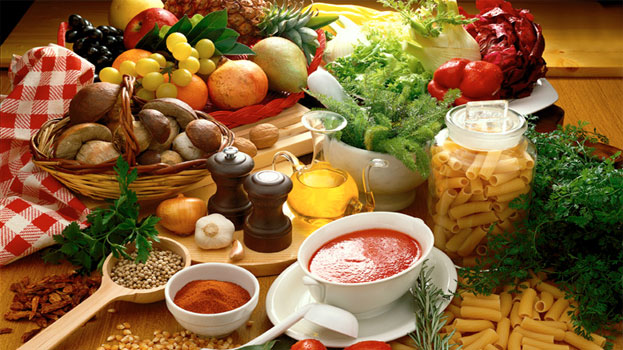9 Easy Steps to Becoming Vegetarian
There are many reasons a person may choose to become a vegetarian. Whether it’s for religious reasons, animal rights, environmental concerns or simply because they want to live a different lifestyle.
Although, while the decision to become a vegetarian may be easy, the journey you go on way not be. Being vegetarian doesn’t always equate to just giving up meat. Some people don’t eat eggs, some eat fish, some eat poultry but no other meat or fish.
So, before you decide to become a vegetarian, the first thing you should do, is learn the different kinds of diets and decide which type of vegetarian you want to be.
Which Veggie Are You?
The different types of vegetarian diets are:
- Vegetarian: Being vegetarian means you do not eat any kind of meat, poultry or fish.
For a healthy diet, you should incorporate grains (quinoa, barley, rice), nuts (almonds, walnuts, cashews), healthy fats (coconut oil, olive oil, avocados) and proteins (tofu, nutritional yeast, eggs) into your meals.
- Vegan: Being vegan isn’t that different than being vegetarian. Of course they don’t eat meat, poultry or fish. The main difference is that vegans don’t eat any kind of animal product (dairy, eggs etc.).
- Partial Vegetarian: Being a partial vegetarian means you still don’t eat meat but you do eat some animal foods. For example, pescatarian’s don’t eat meat but they do eat fish. And pollo-vegetarians eat poultry but won’t eat meat or fish.
Take It Slow
As you can see from the various different kinds of vegetarian diets you can choose from, becoming veggie isn’t straightforward. While completely cutting meat out of your diet all at once won’t make you sick, it will still be a struggle mentally. Especially if you’re used to eating meat on a regular basis.
It is recommended to gradually ease into being vegetarian by starting with one veggie meal a week, then one full veggie day a week until you eventually eat a fully plant-based diet.
Go at whatever pace you think will be best for you.
Protein, Protein, Protein
Making sure to eat the right amount of protein after cutting meat out of your diet is extremely important. Proteins are ‘essential for the growth and maintenance of your body tissues’. So knowing what proteins to eat is also essential.
Foods like ‘beans, nuts, nut butter, eggs, tofu, lentils’ and other meat substitutes are great sources of healthy protein.
Is It Veggie?
While some foods may seem like they’re vegetarian, at times they contain ingredients that aren’t vegetarian friendly. Whether that be gelatine (which contains animal proteins), in foods such as jello and marshmallows. Or a soup made from a specific meat stock (French onion soup is made with beef stock). Always make sure to check if your food is safe for veggies!
Some examples of non-veggie foods are:
- Caesar Salad: contains anchovies.
- Baked Beans – most contain bacon.
- Parmesan Cheese – contains animal rennet (enzymes from the stomach).
- Pie Crust – often made with lard.
- Gummy Candy – made with gelatine.
You’ll be relieved to know that most of these foods have tasty veggie alternatives!
Restaurant Hacks
Most restaurants will offer vegetarian/vegan options for people who prefer to not eat meat but still want to eat out. Although some places won’t have these options on the menu. Before eating out, it may be best to ‘research the restaurant beforehand’.
If the restaurant doesn’t have vegetarian options on their menu, calling ahead to ask if they have any veggie substitutes is always helpful. That way you know you always have something to eat!
Try New Foods
Processed meat substitutes such as fake chicken, veggie burgers; products made from soy and corn; always seem like the best option at first. And while it isn’t bad to incorporate these foods into your meals occasionally, there are healthier choices that you could make.
Try making your own burgers with black beans or quinoa, or substitute pork for canned jackfruit and make your own BBQ pulled ‘pork’. There are so many great vegetarian recipes out there, trying new foods that you may not have eaten as much beforehand opens you up to so many great food opportunities!
Experiment
Leading on from trying new foods, experimenting with new recipes and ingredients is a great tip for new vegetarians. Eating a healthy, plant-based diet may be quite different from what you’re used to. And if you are not used to cooking vegetarian food, cooking the same things on a daily basis may soon become a habit.
Reading vegetarian cookbooks or finding recipes online can help to ensure you don’t get into the boring routine of eating the same food. Try new foods and recipes. The more options you have, the easier it is to be vegetarian long-term!
Take Your Vitamins
Cutting meat and fish out of your diet does have many health benefits, from reduced risk of cancer to helping to maintain a healthy heart. However, it can also increase the risk of nutritional deficiencies. Statistics show that ‘vegetarians are at a higher risk or protein, calcium, iron and vitamin B12 deficiencies’.
Before taking vitamins, it is recommended to incorporate more fruits and vegetables into your diet for nutritional purposes. Although, there are many multivitamins and supplements you can take, such as B12, which helps to maintain ‘brain and nervous system function’. Making sure you’re maintaining a healthy lifestyle is extremely important.
Don’t Give Up
One of the most helpful tips is simple. Don’t give up. Don’t feel guilty if you can’t resist meat at first. Becoming a vegetarian isn’t a smooth journey. There will be many bumps along the way. There is always another meal to eat and another chance to eat plant-based. And as time goes on, it does get easier. So don’t give up, trying your best is enough. There is no right or wrong. Simply what you feel is right for you.
Final Thoughts
Being a vegetarian isn’t easy. If you’ve eaten meat for the vast majority of your life, swapping to a plant-based diet will be a challenge at first, as becoming a vegetarian doesn’t happen overnight. Take it at your own pace and forgive any mistakes you make. They’re bound to happen!
While these tips may not be suitable for everyone, they are a great basis for as to how someone can become a vegetarian. Even if you only benefit from a few of them. They will at the very least give you an idea of as to whether this is a decision you would like to make. And if so, your journey awaits!

















